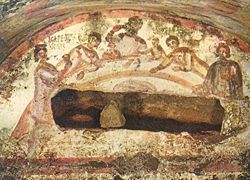Agape
Agapē (from the Greek language: αγάπη, meaning "unconditional, self-sacrificing love") refers to a specific form of love identified in both ancient Greek and Christian texts, which was contrasted with philia (an affection that denoted brotherhood or non-sexual friendship), and eros (an affection of a sexual nature).
Rarely mentioned in non-Christian manuscripts, the term agapē was first utilized by the ancient Greeks to denote the love of a spouse or family, or affection for a particular activity. However, among the early Christians, the meaning of agape transformed into volitional, active, self-sacrificing and all-consuming love that was seen as the idealized form of human and divine behavior. In addition, the concept of Agapē was also a eucharistic type of feast shared by the early Christian community.[1]
Associated with Jesus' sacrificial death on the cross, agapē remains one of the most cherished of all Christian principles today, which continues to inspire much Christian behavior. Accordingly, Christians are ideally committed to reciprocating love by practicing self-sacrificing love towards both God and humanity.
Ancient Usage
As a Greek term for love or affection, agape was rarely used in ancient manuscripts.
It is not impossible that the Greek concept even originated as a transliteration from some Semitic tongue. For example, one title of the goddess Isis was "agape theon" ("beloved/darling of the male gods"), denoting her role as a fertility/life goddess and her pairing as a partner with the masculine god aspects. While this pairing was often sexual in nature, the term "agape" implied a genuine affection and deep love for the goddess.
Although some sources claim agape appears in the Odyssey twice, the word is in fact not used. Instead, two forms of the word agape may be found: agapêton and agapazomenoi. Agapêton is found in Book 5 of the Odyssey and means "beloved" or "well-loved," while agapazomenoi is found in books 7 and 17 and means "to treat with affection."
Agape and the verb agapao are used extensively in the Septuagint as the Greek translation of the common Hebrew term for love, which denotes sexual desire, affection for spouse and children, brotherly love, and God's love for humanity. It is uncertain why agape was chosen, but similarity of consonant sounds (aḥaba) may have played a part. This usage provides the context for the choice of this otherwise obscure word, in preference to other more common Greek words, as the most frequently used word for love in the New Testament.
Greek Words for Love
Ancient Greek distinguishes a number of words for love, of which three are most prominant: eros, philia, and agape. As with other languages, it has been historically difficult to separate the meanings of these words totally. However, the senses in which these words were generally used are given below:
- Eros (ἔρως érōs) is passionate love and attraction including sensual desire and longing. It can be interpreted as a love for someone whom you love more than with the philia love of friendship. Of course, the modern Greek word "erotas" means "romantic love" and even eros in ancient Greek can also apply to dating relationships as well as marriage; but, the ancient Greek word eros does not have to be sexual in nature. For Plato, although eros is initially felt for a person, with contemplation it becomes an appreciation of the beauty within that person, or even becomes appreciation of beauty itself. It should be noted that Plato does not talk of physical attraction as a necessary part of love, hence the use of the word platonic to mean, "without physical attraction." The most famous ancient work on the subject of eros is Plato's Symposium, which is a discussion among the students of Socrates on the nature of eros.[2] Plato said eros helps the soul recall knowledge of beauty, and contributes to an understanding of spiritual truth. Lovers and philosophers are all inspired to seek truth by eros.
- Philia (φιλία philía) means friendship and dispassionate virtuous love. It includes loyalty to friends, family, and community, and requires virtue, equality and familiarity. In ancient texts, philia denoted a general type of love, used for love between family, between friends, a desire or enjoyment of an activity, as well as between lovers. This is the only other word for "love" used in the Koine Greek text of the New Testament besides agape, but even then it is used substantially less frequently.
- Agape (ἀγάπη agápē) refers to a general affection of "love" rather than the attraction suggested by eros; it is used in ancient texts to denote feelings for a good meal, one's children, and one's spouse. It can be described as the feeling of being content or holding one in high regard. This broader meaning of agape or its verb agapao can be seen extensively in the Septuagint. However, when it is used in the New Testament, its meaning becomes more focused, mainly referring to mself-sacrificing, giving love to all — both friend and enemy. Agape in modern Greek simply means "love" as in s'agapo, meaning "I love you," where agapo is the first person singular verb, meaning "I love."
Additionally, modern Greek contains two other words for love:
- Storge (στοργή storgē) means "affection"; it is natural affection, like that felt by parents for offspring. The word was rarely used in ancient works, and almost exclusively as a descriptor of relationships within the family.
- Thelema (θέλημα) means "desire"; it is the desire to do something, to be occupied, to be in prominence.
Agape in Christianity

New Testament
In the New Testament, the verb agapao shows a form of love that is both unconditional and voluntary. It is based on the teachings of Jesus:
- You have heard that it was said, 'Love (agapao) your neighbor and hate your enemy.' But I tell you: Love your enemies and pray for those who persecute you, that you may be sons of your Father in heaven. He causes his sun to rise on the evil and the good, and sends rain on the righteous and the unrighteous. If you love those who love you, what reward will you get? Are not even the tax collectors doing that? (Matther 5:43-46)
- 'Love (agapao) the Lord your God with all your heart and with all your soul and with all your mind.' This is the first and greatest commandment. And the second is like it: 'Love your neighbor as yourself.' All the Law and the Prophets hang on these two commandments. (Matthew 22:37-40)
- My command is this: Love (agapao) each other as I have loved you. (John 15:12)
The noun agape can be found in passages such as:
- Whoever does not love does not know God, because God is love (theos ein agape). (1 John 4:8)
- If I speak in the tongues of men and of angels, but have not love (agape), I am only a resounding gong or a clanging cymbal. If I have the gift of prophecy and can fathom all mysteries and all knowledge, and if I have a faith that can move mountains, but have not love, I am nothing. If I give all I possess to the poor and surrender my body to the flames, but have not love, I gain nothing. Love is patient, love is kind. It does not envy, it does not boast, it is not proud. It is not rude, it is not self-seeking, it is not easily angered, it keeps no record of wrongs. Love does not delight in evil but rejoices with the truth. It always protects, always trusts, always hopes, always perseveres. (1 Corinthians 13:1-7)
However, the verb agapao is at times used in a negative sense, where it retains its more general meaning of "affection" rather than divine love. Such examples include:
- for Demas, because he loved (agapao) this world, has deserted me and has gone to Thessalonica. (2 Timothy 4:10)
- for they loved (agapao) praise from men more than praise from God. (John 12:43)
- Light has come into the world, but men loved (agapao) darkness instead of light because their deeds were evil. (John 3:19)
Christian commentators have expanded the original Greek definition to encompass a total commitment or self-sacrificial love for the thing loved. Because of its frequency of use in the New Testament, Christian writers have developed a significant amount of theology based solely on the interpretation of this word.
However, the verb form agapao is
Tertullian, in his second century defense of Christians remarks how Christian love attracted pagan notice: "What marks us in the eyes of our enemies is our loving kindness. 'Only look,' they say, 'look how they love one another'" (Apology 39).
At the Sermon on the Mount, Jesus said:

Agape as a meal
The word agape in its plural form is used in the New Testament to describe a meal or feast eaten by early Christians, as in Jude 1:12, and 2nd Peter 2:13. The agape meal was either related to the Eucharist or another term used for the Eucharist.[3]
Notes
ReferencesISBN links support NWE through referral fees
- Keating, J. F. The Agape And The Eucharist In The Early Church: Studies In The History Of The Christian Love-Feasts. Kessinger Publishing, LLC, 2007. ISBN 9780548287699
- Lewis, C. S. The Four Loves. Fount, 2002. ISBN 0006280897
- Outka, Gene. Agape: An Ethical Analysis (Yale Publications in Religion). New Haven, CT: Yale University Press, 1977. ISBN 9780300021226
- Plato. The Symposium. Translated by Christopher Gill. Penguin Classics, 2003. ISBN 9780140449273
- Soble, Alan. Eros, Agape and Philia: Readings in the Philosophy of Love. St. Paul, MN: Paragon House Publishers, 1999. ISBN 9781557782786
- Vacek, Edward Collins. Love, Human and Divine: The Heart of Christian Ethics (Moral Traditions). Georgetown University Press; New Ed edition, 1996. ISBN 9780878406272
Credits
New World Encyclopedia writers and editors rewrote and completed the Wikipedia article in accordance with New World Encyclopedia standards. This article abides by terms of the Creative Commons CC-by-sa 3.0 License (CC-by-sa), which may be used and disseminated with proper attribution. Credit is due under the terms of this license that can reference both the New World Encyclopedia contributors and the selfless volunteer contributors of the Wikimedia Foundation. To cite this article click here for a list of acceptable citing formats.The history of earlier contributions by wikipedians is accessible to researchers here:
The history of this article since it was imported to New World Encyclopedia:
Note: Some restrictions may apply to use of individual images which are separately licensed.
